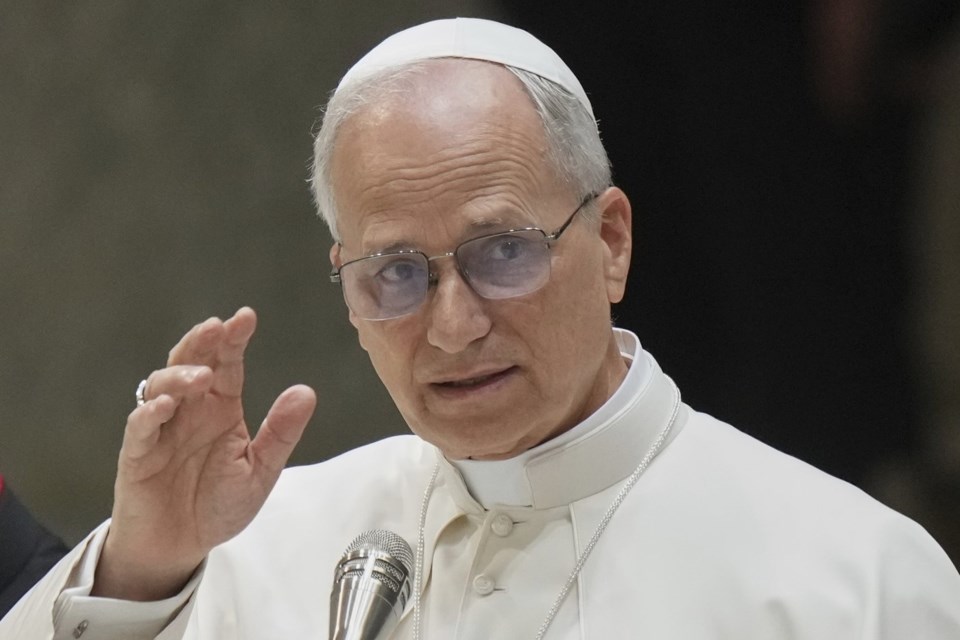WASHINGTON (AP) ‚ÄĒ Just over a month after Pope Leo XIV became in the history of the Catholic Church, a new poll shows that American Catholics are feeling excited about their new religious leader.
About two-thirds of American Catholics have a ‚Äúvery‚ÄĚ or ‚Äúsomewhat‚ÄĚ favorable view of Pope Leo, according to the new survey from , while about 3 in 10 don‚Äôt know enough to have an opinion. Very few Catholics ‚ÄĒ less than 1 in 10 ‚ÄĒ view him unfavorably.
Among Americans overall, plenty of people are still making up their minds about Pope Leo. But among those who do have an opinion, feelings about the first U.S.-born pope are overwhelmingly positive. The survey found that 44% of U.S. adults have a ‚Äúsomewhat‚ÄĚ or ‚Äúvery‚ÄĚ favorable view of Pope Leo XIV. A similar percentage say they don‚Äôt know enough to have an opinion, and only about 1 in 10 see him unfavorably.
As he in a polarized church, Americans with very different views about the future of the church about his pontificate. Terry Barber, a 50-year-old Catholic from Sacramento, California, hopes Leo will seek a ‚Äúmore progressive and modern church‚ÄĚ that is more accepting of all.
‚ÄúI‚Äôm optimistic. Certainly, the first pope from the United States is significant,‚ÄĚ said Barber, who identifies as a Democrat. ‚ÄúSince he worked under the previous pope, I‚Äôm sure he has similar ideas, but certainly some that are original, of his own. I‚Äôm looking forward to seeing what, if any changes, come about under his leadership.‚ÄĚ
Bipartisan appeal
About half of Democrats have a favorable view of the new pope, as do about 4 in 10 Republicans and independents. Republicans are a little more likely than Democrats to be reserving judgment. About half of Republicans say they don’t know enough to have an opinion about the pope, compared to about 4 in 10 Democrats.
Republicans, notably, are no more likely than Democrats to have an unfavorable opinion of the pope. About 1 in 10 in each group view Pope Leo unfavorably.
Victoria Becude, 38, a Catholic and Republican from Florida, said she’s excited about the first U.S.-born pope and hopes he can steer the country back to Catholic doctrine and make Americans proud.
‚ÄúI‚Äôm rooting for him,‚ÄĚ she said. ‚ÄúI hope that America can get back to faith, and I hope he can do that.‚ÄĚ
Being a political liberal or conservative, of course, isn't the same thing as identifying as a liberal or conservative Catholic. But the poll found no discernible partisan gap among Catholics on Pope Leo, and Catholics across the ideological spectrum that Leo will be able to heal some of the divisions that emerged during the pontificate of his predecessor, Pope Francis.
Pope Leo recently in the world as he prayed for reconciliation and dialogue ‚ÄĒ a to make the Catholic Church a symbol of peace.
Before becoming pope, Cardinal Robert Prevost presided over one of the most revolutionary reforms of Pope Francis’ pontificate by that vets nominations for bishops. He also has said decisively that women cannot be ordained as priests.
Donald Hallstone, 72, a Catholic who lives in Oregon, said he expects that Leo will continue to promote women in governance positions ‚Äúat a time when there‚Äôs a shortage of priests‚ÄĚ and other leaders in the church.
‚ÄúIt‚Äôd be great to see women in those roles,‚ÄĚ he said. ‚ÄúWomen were not excluded in the first centuries.‚ÄĚ
On the other hand, U.S. Catholics hope Leo will focus on Catholic doctrinal opposition to same-sex marriage and abortion.
Becude, the Republican, said she‚Äôs against same-sex relationships because she believes that unions should be between a man and a woman, . Even though she describes herself as ‚Äúvery conservative,‚ÄĚ though, she‚Äôs in favor of reproductive rights even when .
‚ÄúI don‚Äôt believe that they should stop women from having abortions,‚ÄĚ she said. ‚ÄúWe should have our own rights because you don‚Äôt know the circumstances behind the reason why a woman would want the abortion in the first place.‚ÄĚ
Few have negative views ‚ÄĒ yet
There’s plenty of room for views to shift as Leo’s agenda as pope becomes clear.
Not all Americans have formed an opinion of the new pope yet; particularly, members of other religious groups are more likely to be still making up their minds. About half of born-again Protestants, mainline Protestants, and adults with no religious affiliation don‚Äôt know enough to have an opinion about the pope, although relatively few ‚ÄĒ about 1 in 10 ‚ÄĒ in each group have an unfavorable view of him.
Older Americans ‚ÄĒ who are more likely to identify as Catholics ‚ÄĒ are also more likely than younger Americans to be fans of Leo's. About half of Americans ages 60 and older have a favorable view of Pope Leo, compared to about 4 in 10 Americans under 30.
But even so, only about 1 in 10 U.S. adults under 30 have an unfavorable view of the pope right now.
Mercedes Drink, 31, is from the pope’s hometown of Chicago. She still hopes that women will become ordained under his pontificate.
‚ÄúIt‚Äôs cool; I like him because he brings something different,‚ÄĚ said Drink, who lives in Minnesota and identifies ‚ÄĒ atheists, agnostics, or nothing in particular.
‚ÄúAs a young woman, I hope that he can bring change ‚Ķ considering who he is, he brings something new to the table. I hope he opens the world‚Äôs eyes to modernizing the church, bringing more people in, having more diversity.‚ÄĚ
___
Henao reported from Princeton, N.J.
___
Associated Press religion coverage receives support through the AP’s with The Conversation US, with funding from Lilly Endowment Inc. The AP is solely responsible for this content.
___
The AP-NORC poll of 1,158 adults was conducted June 5-9, using a sample drawn from NORC’s probability-based AmeriSpeak Panel, which is designed to be representative of the U.S. population. The margin of sampling error for adults overall is plus or minus 4 percentage points.
Luis Andres Henao And Amelia Thomson-deveaux, The Associated Press



